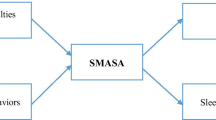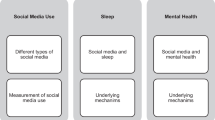Abstract
A significant aspect of sleep related studies is formed by the studies that evaluate sufficient sleep duration and the impact of short or long sleep time on health. The determinants of sleep duration that are important for the continuance of both health and daily life are an important discussion area. This study was performed in order to determine the factors related to the sleep duration of individuals aged 18–65, their cultural beliefs related to sleep duration and other variables in this type of descriptive cross-sectional (n = 534). The data were collected through a three-part questionnaire consisting of 44 questions created by the researchers by searching literature. A backward multiple regression analysis was used to identify the determinants of the sleep duration. Being male, (β = −0.11), talking during sleep (β = -0.08), having problems falling asleep (β = −0.08), having the habit of setting the alarm clock (β = −0.13), and having the belief that “The time passed while sleeping is a waste, so the sleep time must be short” (β = −0.26), and “If I have insomnia, I wait to fall asleep without getting up” (β = −0.06) were found to negatively affect sleep duration. Agreeing with the statements; “Sleeping refreshes/clears the mind” (β = 0.22) “Sleeping early and getting up early makes people healthy” (β = 0.09) “Sleeping at noon for a short time is important” (β = 0.09) “I daydream before sleeping” (β = 0.178). “If I have insomnia, I use drugs” (β = 0.110) positively affects and increases sleep duration.
Similar content being viewed by others
References
Petrov ME, Lichstein KL, Baldwin CM. Prevalence of sleep disorders by sex and ethnicity among older adolescents and emerging adults: relations to daytime functioning, working memory and mental health. J. Adolesc. 2014; 37: 587–97.
Kao CC, Huang CJ, Wang MY, Tsai PS. Insomnia: prevalence and its impact on excessive daytime sleepiness and psychological well-being in the adult Taiwanese population. Qual. Life Res. 2008; 17: 1073–80.
Morphy H, Dunn KM, Lewis M, Boardman HF, Croft PR. Epidemiology of insomnia: a longitudinal study in a UK population. Sleep 2007; 30: 274–80.
Jean-Louis G, Magai CM, Cohen CI et al. Ethnic differences in self-reported sleep problems in older adults. Sleep 2001; 24: 926–33.
Leger D, Scheuermaier K, Philip P, Paillard M, Guilleminault C. SF-36: evaluation of quality of life in severe and mild insomniacs compared with good sleepers. Psychosom. Med. 2001; 63: 49–55.
Hajak G. Epidemiology of severe insomnia and its consequences in Germany. Eur. Arch. Psychiatry Clin. Neurosci. 2001; 251: 49–56.
Furihata R, Uchiyama M, Takahashi S et al. The association between sleep problems and perceived health status: a Japanese nationwide general population survey. Sleep Med. 2012; 13: 831–7.
Kronholm E, Harma M, Hublin C, Aro AR, Partonen T. Self-reported sleep duration in Finnish general population. J. Sleep Res. 2006; 15: 276–90.
Knutson KL. Sociodemographic and cultural determinants of sleep deficiency: implications for cardiometa-bolic disease risk. Soc. Sci. Med. 2013; 79: 7–15.
Buxton OM, Marcelli E. Short and long sleep are positively associated with obesity, diabetes, hypertension, and cardiovascular disease among adults in the United States. Soc. Sci. Med. 2010; 71: 1027–36.
Gottlieb DJ, Punjabi NM, Newman AB, Resnick HE, Redline S et al. Association of sleep time with diabetes mellitus and impaired glucose tolerance. Arch. Intern. Med. 2005; 165: 863–7.
Kronholm E, Laatikainen T, Peltonen M, Sippola R, Partonen T. Self-reported sleep duration, all-cause mortality, cardiovascular mortality and morbidity in Finland. Sleep Med. 2011; 12: 215–21.
Knutson KL. Sleep duration and cardiometabolic risk: a review of the epidemiologic evidence. Best Pract. Res. Clin. Endocrinol. Metab. 2010; 24: 731–43.
Taylor DJ, Lichstein KL, Durrence HH. Insomnia as a health risk factor. Behav. Sleep Med. 2003; 1: 227–47.
Nakata A. Work hours, sleep sufficiency, and prevalence of depression among full-time employees: a community-based cross-sectional study. J. Clin. Psychiatry 2011; 72: 605–14.
Ram S, Seirawan H, Kumar SK, Clark GT. Prevalence and impact of sleep disorders and sleep habits in the United States. Sleep Breath. 2010; 14: 63–70.
Leproult R, Van Cauter E. Role of sleep and sleep loss in hormonal release and metabolism. Endocr. Dev. 2010; 17: 11–21.
Pack AI, Maislin G, Staley B et al. Impaired performance in commercial drivers: role of sleep apnea and short sleep duration. Am. J. Respir. Crit. Care Med. 2006; 174: 446–54.
Maslowsky J, Ozer EJ. Developmental trends in sleep duration in adolescence and young adulthood: evidence from a national United States sample. J. Adolesc. Health 2014; 54: 691–7.
Krueger PM, Friedman EM. Sleep duration in the United States: a crosssectional population-based study. Am. J. Epidemiol. 2009; 169: 1052–63.
Lo JC, Leong RLF, Loh K, Dijk D, Chee WL. Young adults’ sleep duration on work days: differences between East and West. Front. Neurol. 2014; 5: 81.
Ferrie JE, Shipley MJ, Cappuccio FP et al. A prospective study of change in sleep duration: associations with mortality in the Whitehall II cohort. Sleep 2007; 30: 1659–66.
Bin YS, Marshall NS, Glozier N. Original contribution sleeping at the limits: the changing prevalence of short and long sleep durations in 10 countries. Am. J. Epidemiol. 2013; 177: 826–33.
Grandner MA, Patel NP, Gehrman PR et al. Who gets the best sleep? Ethnic and socioeconomic factors related to sleep complaints. Sleep Med. 2010; 11: 470–8.
Adenekan B, Pandey A, McKenzie S, Zizi F, Casimir GJ, Jean-Louis G. Sleep in America: role of racial/ethnic differences. Sleep Med. Rev. 2013; 17: 255–62.
Shankar A, Charumathi S, Kalidindi S. Sleep duration and self-rated health: the National Health Interview Survey. Sleep 2011; 34: 1173–7.
Hale L, Do P. Racial differences in self-reports of sleep duration in a population-based study. Sleep 2007; 30: 1096–103.
Chang JJ, Salas J, Habicht K, Pien GW, Stamatakis KA, Brownson RC. The association of sleep duration and depressive symptoms in rural communities of Missouri, Tennessee and Arkansas. J. Rural Health 2012; 28: 268–76.
Kohatsu ND, Tsai R, Young T et al. Sleep duration and body mass index in a rural population. Arch. Intern. Med. 2006; 166: 1701–5.
Patel SR, Malhotra A, Gottlieb DJ, White DP, Hu FB. Correlates of long sleep duration. Sleep 2006; 29: 881–9.
Patel SR, Hu FB. Short sleep duration and weight gain: a systematic review. Obesity 2008; 16: 643–53.
Cecil GH. Culture, Health and Ilness. Hodder Arnold: London, 2007; 185–95
Lemeshow S, Hosmer DW, Klar J, Lwanga SK. Under the Title Adequacy of Sample Size in Health Studies by World Health Oraganization (Tranlated: S.O(guz Kayaalp). Hacettepe Taş: Ankara, 2000.
Akgül A. Tibbi Arastirmalarda Statistiksel Analiz Teknikleri. SPSS Uygulamalari, Üçüncü Baski, Emek Ofset: Ankara, 2005; 382–
Anujuo K, Stronks K, Snijder M, Jean-Loius G, Ogedegbe G, Agyemang C. Ethnic differences in self-reported sleep duration in The Netherlands the Helius study. Sleep Med. 2014; 15 1115–21.
American Academy of Sleep Medicine. International classification of sleep disorders, revised: diagnostic and coding manual. Chicago, 2001.
Takahashi M, Nakata A, Haratani T, Otsuka Y, Kaida K, Fukusawa K. Psychosocial work characteristics predicting daytime sleepiness in day and shiftworkers. Chronobiol. Int. 2006; 23: 1409–22.
Fukusawa K, Aikawa H, Okazaki I et al. Perceived sleepiness of non-shift working men in two different types of work organization. J. Occup. Health 2008; 48: 230–8.
Hublin C, Kaprio J, Partinen M, Heikkila K, Koskenvuo M. Daytime sleepiness in an adult, Finnish population. J. Intern. Med. 1996; 239: 417–23.
Nugent AM, Gleadhill I, McCrum E, Patterson CC, Eavens A, Macmahon J. Sleep complaints and risk factors for excessive daytime sleepiness in adult males in Northern Ireland. J. Sleep Res. 2001; 10: 69–74.
Chakravorty S, Jackson N, Chaudhary N et al. Daytime sleepiness: associations with alcohol use and sleep duration in Americans Hindawi Publishing Corporation sleep disorders. Sleep Disord. 2014; 2014: 959152.
Burgard SA, Ailshire JA. Gender and time for sleep among US adults. Am. Sociol. Rev. 2013; 78: 51–69.
Miller EH. Woman and Insomnia. Clin. Cornerstone 2004; 6: 8–18.
McClain JJ, Lewin DS, Laposky AD, Kahle L, Berrigan D. Associations between physical activity, sedentary time, sleep duration and daytime sleepiness in US adults. Prev. Med. 2014; 66: 68–73.
Stranges S, Dorn JM, Cappuccio FP et al. A population-based study of short sleep duration and hypertension: the strongest association may be in premenopausal women. J. Hypertens. 2010; 28: 896–902.
Chatzitheochari S. Lack of sleep, work and the long hours culture: evidence from the UK time use survey. Work Employ. Soc. 2009; 23: 30–48.
Kocoglu D, Akin B, Cingil D, Sari E. Insomnia in rural communities and dysfunctional beliefs and attitudes about sleep as a risk factor of insomnia. J. Cogn. Behav. Psychother. 2013; 13: 211–14.
Kumari M. Sleep Duration and Sleep Disturbance Editors: James Banks, Carli Lessof, James Nazroo, Nina Rogers, Mai Stafford and Andrew Steptoe. Institute for Fiscal Studies: London, 2010, ISBN: 978-1-903274-80-4.
Faubel R, Lopez-Garcia E, Gualler-Castillon P, Graciani A, Banegas JR, Rodriguez-Artalejo F. Usual sleep duration and cognitive function in older adults in Spain. J. Sleep Res. 2009; 18: 427–35.
Ferrie JE, Shipley MJ, Albaraly TN, Marmot MG, Kivimaki M, Singh-Manoux A. Change in sleep duration and cognitive function: findings from the Whitehall II study. Sleep 2011; 34: 565–73.
Touchette E, Petit D, Seguin JR, Boivin M, Tremblay RE, Montplaisir JY. Associations between sleep duration patterns and behavioral/cognitive functioning at school entry. Sleep 2007; 30: 1213–9.
Fernández-Mendoza J, Ilioudi C, Montes MI et al. Circa-dian preference, nighttime sleep and daytime functioning in young adulthood. Sleep Biol. Rhythms 2010; 8: 52–62.
Lange L, Randler C. Morningness-eveningness and behavioural problems in adolescents. Sleep Biol. Rhythms 2011; 9: 12–18.
Diyanet Islam Ansiklopedisi 25. Cilt 83. Sayfa KAYLÛLE Maddesi.
The Joanna Briggs Institute (JBI). Nursing intervention for adult patients experiencing chronic pain. Best Pract. 2011; 15: 1–4.
Şenal F. Uyku ve Rüya. Bilim ve Teknik. 2005; (12): 2–19.
Author information
Authors and Affiliations
Corresponding author
Rights and permissions
About this article
Cite this article
Arslan, S., Kocoglu, D. & Durmus, M. Cultural beliefs affecting sleep duration. Sleep Biol. Rhythms 13, 287–296 (2015). https://doi.org/10.1111/sbr.12117
Accepted:
Published:
Issue Date:
DOI: https://doi.org/10.1111/sbr.12117




